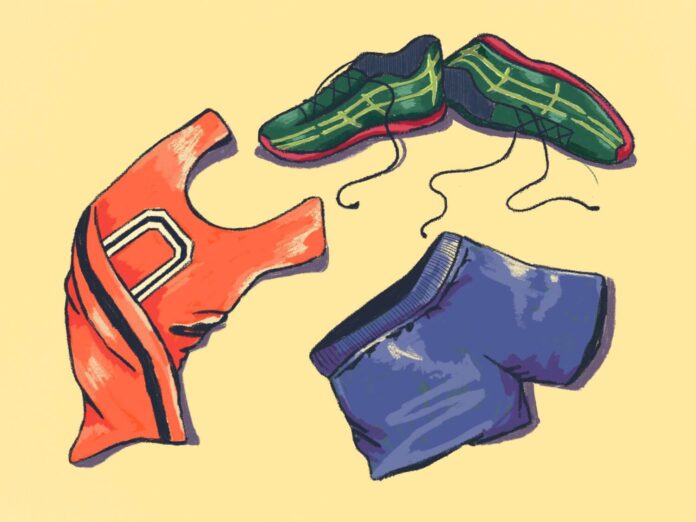I’m a master at the art of quitting. From baseball to Mandarin to fruitarianism, I’ve dedicated myself to every activity imaginable, only to quit a short time thereafter. Despite my unfortunate track record, there was one thing I thought I’d never quit: running. Throughout high school, I logged more than 5,000 miles, ran 4:22 for a mile and captained our cross country team to its first sectional victory since the eighties. Running was my life in high school, and I thought it would be my life in college too — until it wasn’t.
To my own amazement, after only a month on the cross country team at Occidental, I quit running. Despite committing every weekday afternoon and weekend morning to practice, I felt unfulfilled. Practices felt aimless. I missed the familiarity I’d had with my teammates in high school. The prospect of competing at the collegiate level didn’t excite me, and I’d no longer catch myself daydreaming about the sport throughout the rest of my day. I knew I’d lost my passion for running. So, just like that, I quit.
Any passion to which you dedicate serious time and alacrity should be focused on practicing perfection. By practicing perfection, I mean nothing more than paying attention to doing the small things correctly. These small things matter because in the minute aspects of our passions, there’s a sense of tangible ‘rights’ and ‘wrongs’ that gets abstracted when we focus only on our greater goals. When practicing perfection through this diligence, I have never misled myself to believe that I’d ever attain perfection, but rather that a foundation of consistent improvement would solidify through a gradual accumulation of performing these small ‘rights’ consistently.
In running, I’d once practiced perfection by executing warm-up drills correctly, stretching plenty and sleeping sufficiently. After just a few weeks in college, I realized that I no longer cared if my drills were done correctly or if I’d stretched and slept enough. The focus I had once applied in ancillary warm-up moments at practice now fled to fantasizing about how else I could be spending my time, like reading or exploring the city. Because of how drastically different college is from high school, exploring LA and reading for class suddenly became necessary experiences for me. But when daydreams of these commitments would trickle into my workouts, which were the most intense moments of my days, I began to wonder if I hadn’t quit already. My growing disregard for the smaller aspects of my training told me I had. Quitting is more a mindset than a definite action.
There’s absolutely a case to be made for not quitting a years-long commitment just because of a few directionless weeks. But don’t acquiesce to spending your time doing something purposeless because of a sunk-cost fallacy in regards to the time you’ve invested. I put about a thousand hours into becoming the best runner I could possibly be in high school. Yet, in college I knew that upholding my commitment to my new team would’ve continued to deplete my social and emotional energy. Leaving the unfulfilling hours of practice behind gave me more time to make social connections off the team and find new activities to dedicate myself to.
In addition to having invested tons of time to running in the past, the prospect of having to explain my decision to quit to my new teammates nagged at me. The fear of having to explain a decision that went against the inertia of my commitment was intimidating. Then I realized that, in the best possible way, my teammates didn’t really care. I’m the same person to them whether or not we spend our afternoons running together. Many of the friendships I started with ex-teammates while I was still running have grown into my closest connections at Occidental. Despite not seeing all of my ex-teammates on such a consistent basis, my fear of breaking an unspoken social contract as a teammate turned out to be unfounded.
In the words of Steve Prefontaine, the patron saint of American distance running, “to give anything less than your best is to sacrifice the gift.” I believe that the gift Prefontaine is referring to is the ability to be truly alive through absolute dedication. When I quit running, I hadn’t sacrificed the gift, I saved it by giving myself new ways to dedicate my time. Now, I have the freedom to focus on doing the small things right in new activities, like writing for The Occidental or summiting peaks in the San Gabriel Mountains such as Strawberry Peak, which I hiked last December. With time, these hobbies might blossom into true passions. I found through running that I could find meaning in my nuanced passion through completing many small tasks. When I lost enthusiasm for diligence, I knew it was time to try new things. If you’re no longer focused on pursuing perfection through the small things of a commitment, don’t keep trying to convince yourself you’re still passionate about it. Don’t sacrifice the gift.
Contact Jimmy Miller at jmiller4@oxy.edu.
![]()































Hi Jimmy,
I enjoyed the read. It can be hard to “know when to hold ’em; know when to fold ’em” as Kenny Rogers once said.
Having switched majors a couple times and embracing the uncertainty of investing immense amounts of time in school co-curriculars I can relate. Passion and purpose certainly seem to be a large part of it. Sometimes the best thing to do is walk away. Other times it’s important to dig in and stick it out. Generally we know in our hearts which it is. Nietzsche once said “One should not dodge one’s tests, though they may be the most dangerous game one could play and are tests that are taken in the end before no witness or judge but ourselves.” Of course he could be wrong. But that’s the thing about existentialism. We are condemned to freedom. We are the ones who decide.
Thanks,
Caden, a student from Pepperdine University
Ex-XC runner here, I love this piece a lot Jimmy! It took so much for me to decide to give up the sport even when I knew I didn’t love it. Such a refreshing interpretation of “giving up” and dedicating your time to other things you knew you had a passion for.